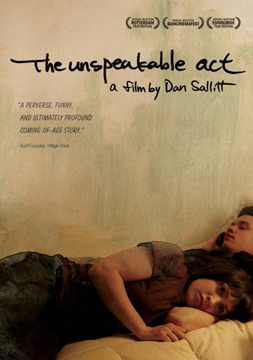| ENFANT TERRIBLE
an essay by adrian martin Not that all is gentle inside or between these characters; in fact, far from it—and the music-less atmosphere is a way of making us, as well as them, a bit uncomfortable, even a little embarrassed, in the spaces between words. The film announces its central subject just as quietly, and matter-of-factly. Jackie, as she tells us in her voice-over narration during the opening shot, has always felt what we could euphemistically call a 'special bond' between herself and Matthew: that they are meant for each other, and meant always to be together. It's not a case of incest, but rather of something rarely acknowledged—and almost never treated with any sensitivity or insight—within cinematic fiction: an intense intimacy, a love between siblings, a particular sort of folie à deux born from the closeness—and perhaps also the claustrophobia—of the domestic, nuclear family unit. Incest does not and will not happen (and Sallitt does not play on that kind of prurient suspense); but the possibility of it, the thought of it, nonetheless comes to reside at the heart of the interpersonal exchanges and tensions between the characters. It's not really a matter of 'how far will we go?'; more a matter of 'what's implied here, between us, and how can we deal with it?'. Within the film itself, outside of those uncomfortably confronting or needling conversations which Jackie keeps forcing on Matthew, nobody who is at all aware of this brother-sister vibe can indeed openly admit or discuss it in anything other than euphemism, evasion, or uneasy jokes. As Jackie says: while she can issue the most outrageous statements about her needs and desires concerning Matthew, everyone in earshot will bend over backwards to place "the blandest possible interpretation" on it. But the fantasy of sibling intimacy—beautifully and economically conveyed in the moments where this brother and sister share a bathroom, or curl up on a couch—is slowly coming apart for Jackie, just as it already has, before the story begins, for Matthew. His path is obvious—leaving home, attending college, beginning 'mature' relationships—and thus left unstressed by the film; the deliberate note of emotional inexpressivity, of gormlessness even, in Matthew's character as incarnated by Hirschkron, deftly displaces his 'journey' from the center of our attention. But how Jackie negotiates her particular 'rite of passage' is the unmistakeable dramatic focus and substance of The Unspeakable Act. Jackie is not always so assertive or sure of herself as she sometimes seems, not always the implacable enfant terrible—such as in the scene where she drives Matthew away by probing what "special sexual perversion" he might have that only she could selflessly satisfy. In a contrary incident, Matthew effectively 'kills the mood' of their pleasant night out when he asks whether having children together is part of her incest scenario, because he's not sure what the 'limits' of her imagining are—and this is just a little too much reality for her to bear at that moment. With an enviable naturalness and logic, the film eventually arrives at a psychotherapeutic or psychoanalytic situation, which is less a grand, cathartic 'solution' than a way of simply, gradually, working things through, via (as the film name-checks the techniques) transference and counter-transference: Jackie has sessions with therapist Linda (Caroline Luft). They discuss many things: family, the attachment to Matthew, the depression Jackie feels upon his absence; and the eventual loss of her virginity with another, gormless guy who can't even say hi to her in public two days later. Is this, for Jackie, the same 'road to normalcy' that Matthew seems determined to take? Not at all; the words that resonate, long after the film is over, are Jackie's voice-over summation that she is "the exception to so many rules"—and we believe her, all the way. Sallitt's careful scripting and direction give his film a lightly novelistic aura: sometimes Jackie's narration reflects on the events we see; at other moments it wanders off, filling the quiet spaces in the soundtrack with charmingly digressive reflections. Our sense of closeness to Jackie owes just as much to Tallie Medel's sometimes droll, often understated, but always absorbing performance: whether sneaking a peak during study break at the messages on her telephone, or resting her forehead in soulful agony against Matthew's door. Dan Sallitt is well known as a superb, insightful, encyclopedic film critic; he appears to have helped inspire and encourage a new generation of American cinephiles who intermix writing, programming, and film/video making. But it would be too easy, in a sense, to account for his film's quiet power by duly noting its clear references—to Éric Rohmer, to whom the movie is touchingly dedicated, or to the few other intense-sibling milestones like Jean Cocteau & Jean-Pierre Melville's Les enfants terribles (1950) and Benoît Jacquot's Les enfants du placard (1977)—or by free-associating across to American Mumblecore, Lena Dunham's TV series Girls, and the Australian Sleeping Beauty (2011). The Unspeakable Act asks not to be viewed, primarily, through a movie-soaked filter of that kind: the moments when Jackie plaintively protests that Matthew is starting to cruelly make fun of her, or declares to him, "what you're saying is unbearably sad to me"—these moments are meant to hit us directly, without mediation. And they sure do. ----- Adrian Martin is Distinguished Visiting Professor of Film Studies at Goethe University, Frankfurt, co-editor of LOLA magazine (www.lolajournal.com), and author of Last Day Every Day (Punctum Books: English, Spanish & Portuguese editions). blog comments powered by Disqus |



